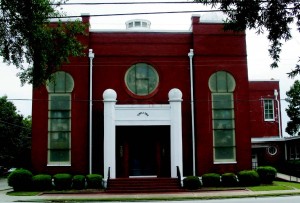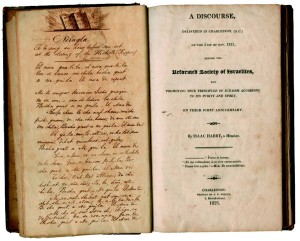Temple Sinai Donates Archives
Temple Sinai – Sumter SC
Donates Archives to the College of Charleston
 The study of Jewish history is continually enriched by the appearance of exciting source materials in unexpected places. In 1947, with the discovery of the Dead Sea Scrolls near the ancient West Bank settlement of Khirbet Qumran, a new chapter opened in early Jewish history. In 2007, with the donation of the aptly named Temple Sinai archives to the College of Charleston, another rich treasury was revealed. While not as momentous as the scrolls, the materials from Sumter’s historic congregation nevertheless promise to open up new vistas in South Carolina and American Jewish history.
The study of Jewish history is continually enriched by the appearance of exciting source materials in unexpected places. In 1947, with the discovery of the Dead Sea Scrolls near the ancient West Bank settlement of Khirbet Qumran, a new chapter opened in early Jewish history. In 2007, with the donation of the aptly named Temple Sinai archives to the College of Charleston, another rich treasury was revealed. While not as momentous as the scrolls, the materials from Sumter’s historic congregation nevertheless promise to open up new vistas in South Carolina and American Jewish history.
This remarkable gift from the trustees of Temple Sinai came to the Jewish Heritage Collection in the Addlestone Library after extensive deliberations by the congregation’s Long Term Planning Committee and timely consultations with officers of JHSSC. Faced with declining membership and an uncertain future, Temple leaders charged the Committee with making the best disposition possible for Sinai’s archives. The decision to give the collection to the College, explained committee member Robert Moses, “was based on what was best to protect and preserve them for the long haul, while assuring their ready accessibility.”
After a flurry of e-mails and phone calls, a team from the College drove to Sumter—Harlan in a College van with photographers Joe and Edie Rubin and Dale with Robert’s daughter Elizabeth—and began packing the precious records. We were overwhelmed by both the wealth of the collection and the heartbreakingly generous gift of its stewards, who had given so much of themselves to Temple Sinai over their lifetimes. While Sumter’s and South Carolina’s Jewish heritage was being saved for posterity by this selfless act, the passing of the torch reflected a sad reality. We knew, as we packed, that the collection was extraordinary and that the congregation deserved everlasting thanks.
 Sumter’s illustrious Jewish past began in the 1820s. Early settlers included members of the Moïse and Moses families from Charleston, whose descendants gave Temple Sinai the papers of their forebears. Intellectual luminaries such as Isaac Harby, whose daughter Octavia settled in Sumter, and Penina Moïse, who refugeed there with her sister and niece during the Civil War, are well represented in the collection.
Sumter’s illustrious Jewish past began in the 1820s. Early settlers included members of the Moïse and Moses families from Charleston, whose descendants gave Temple Sinai the papers of their forebears. Intellectual luminaries such as Isaac Harby, whose daughter Octavia settled in Sumter, and Penina Moïse, who refugeed there with her sister and niece during the Civil War, are well represented in the collection.
The Temple’s gems include a manuscript prayer book penned by Harby and bound together with the discourse he delivered before the Reformed Society of Israelites in 1825 on the first anniversary of the organization. Here was a cornerstone of the American Reform movement: handwritten prayers, in Hebrew and English, of the first Reform services held in America, and an extremely rare first edition of Harby’s Discourse. We also were thrilled to find a letter Harby had written to John C. Calhoun in 1816, a published copy of Harby’s play Gordian Knot, written in 1810 before his 19th year and corrected by his own hand, and the original script of Tutoona, or the Indian Girl, a drama composed by Isaac’s brother George Washington Harby and performed in New Orleans’ American Theater in 1835.